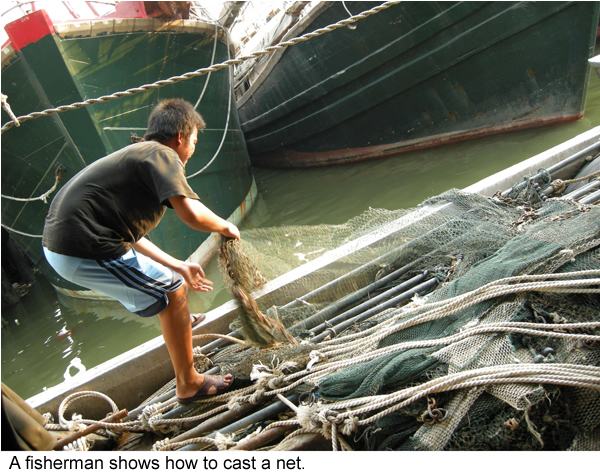|
Light of
Fishing Boats Grows Dimmer
By Ruth Lam
The light of fishing
boats has been flickering along the coast of
The fishing industry
has been in
"I don't want
my children to work in this field. Fishing does not have a future," said
Kwan Man Fai, a fisherman, who belongs to a special group called Tanka ( 蜑家, boat
people) in
Aquaculture can
eliminate expenses of fuel and repairs a fishing boat requires. It can
produce seafood in a great amount and sell it at lower prices. Kwan remembers
that a kilogram of prawns were sold at the wholesale price of MOP30 about 20
years ago; however, aquaculture changed it. The same amount of prawns sells
for only MOP10 today. Although all fishermen are unwilling to lower their prices,
trade companies do not make any concession. Otherwise, trade companies would
only depend on seafood from aquaculture.
Traditionally, the Tanka is a group in the
Most fishermen do not
want their next generation to be like them and to work in such a hard
industry; they prefer to send their children to school and live ashore. As a
result, fewer people work in this field, which causes a shortage of workers
in the fishing industry.
Facing difficulty in
hiring workers, the fishing industry in Macau can only rely on imported
laborers from mainland
The prolonged high
price of fuel is another reason for fishermen to abandon their boats and to
live ashore. Kwan revealed that they can earn over MOP10, 000 in a day when
fishing in the mainland ocean. However, this is not their net profit. They
have to deduct MOP7,000-8,000 for fuel expenses for
each journey.
The Macau Government
has taken measures to help fishermen in recent years. There is a fishing
moratorium which lasts for two months every summer. The purpose is to reduce
over-fishing and improve the supply of fish. However, Kwan explained that
during this period fisherman have to face another extreme difficulty. They
have to dock their boats in the harbor for two months without income and the
humidity of the coast will cause damage to the engine and machines. When the
fishing moratorium is over, they have to spend a lot of money on repairs.
The Macau Government
then provides another measure to help ease this burden. Fishermen can borrow
money interest free from the government to maintain their living in these two
months and for repairing their fishing boats. However, this can only help
them to solve their financial problem temporarily. Kwan said that these
measures are almost useless and cannot solve their problems in the long run.
"I'm sure there
will be no more fishermen in
|
